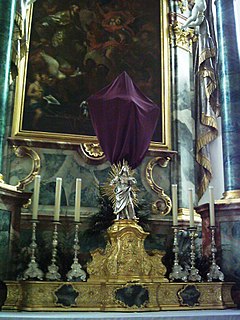In the 1963 monastic breviary, today is a memorial for St Cletus only.
Older breviaries, though, mark it as a semiduplex feast of both Popes SS Cletus and Marcellinus. Divinum Officium supplies the following reading for the saints:
Cletus was a Roman, the son of Emilian, of the Fifth Region of the city, and the street called Noble. He ruled the Church in the time of the Emperors Vespasian and Titus. In accordance with the precept of the Prince of the Apostles He ordained twenty-five Priests for the city. He was the first Pope who made use in his letters of the phrase "Health and Apostolic Benediction." When he had ruled the Church for twelve years, seven months, and two days, and brought it into an excellent state of order, in the reign of the Emperor Domitian, and the second persecution since the time of Nero, he was crowned with martyrdom, and buried on the Vatican mount, hard by the body of blessed Peter.
Marcellinus was a Roman; he ruled the Church from the year 296 to the year 304, during the savage persecution which was ordered by the Emperor Diocletian. He suffered through the false severity of those who blamed him as being too indulgent toward them who had fallen into idolatry, and for this reason also hath been slandered to the effect that he himself burnt incense to idols but this blessed Pope, on account of his confession of the faith, was put to death along with three other Christians, whose names are Claudius, Cyrinus, and Antoninus. At the command of the Emperor their bodies were cast out unburied, and lay so for thirty- six days. At the end of that time St Peter appeared in a dream to Blessed Marcellus, and in obedience to his command the said Marcellus went with certain Priests and Deacons, singing hymns, and carrying lights, and buried these four bodies honourably in the Cemetery of Priscilla upon the Salarian Way. Marcellinus ruled the Church for seven years, eleven months, and twenty-three days. During this time he held two Advent ordinations, and ordained at them four Priests, and five Bishops for divers Sees.
![[IMG]](http://lh6.ggpht.com/-nyAkmtGzC1o/UXmhTOLwVcI/AAAAAAAAD-Q/57JqPGddREk/April%25252026.--STS.%252520CLETUS%252520and%252520MARCELLINUS%25252C%252520Popes%25252C%252520Martyrs.%252528butlers%2525201894%252520saint%252520of%252520the%252520day%252529_img_1.png)




